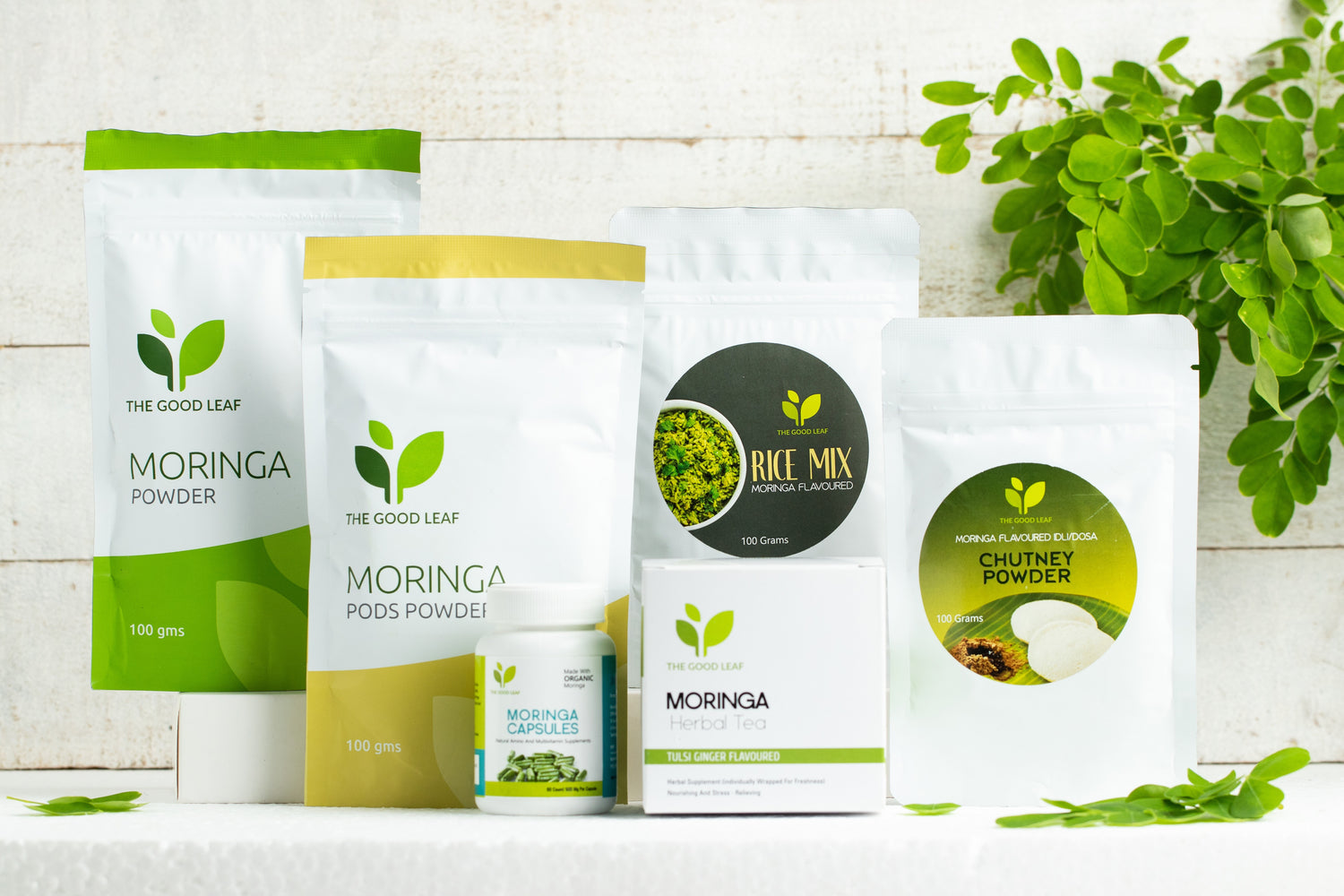Moringa oleifera is also known as the horseradish tree, Ben tree or drumstick tree. It hails from India, Pakistan and Nepal, as well as parts of Africa and South America.
It has been used as a medicinal herb for centuries, mainly to build immunity and prevent diseases. Now, Moringa is gaining popularity as a ‘superfood’ because it is power packed with vitamins, iron and a lot more - leaving behind carrots, oranges and even milk in terms of nutrition value.
The Health Benefits Of Adding Moringa To Your Daily Routine:
Rich in Vitamins and Minerals
Moringa leaves are rich in vitamins A, C, B1 (thiamin), B2 (riboflavin), B3 (niacin), B6 and Folate. They are also rich in magnesium, iron, calcium, phosphorus, and zinc.
One cup of moringa leaves will contain 2 grams of protein, magnesium (8 per cent of the RDA), Vitamin B6 (19 per cent of the RDA), Iron (11 per cent of the RDA), Riboflavin (11 per cent of the RDA) and Vitamin A (9 per cent of the RDA).
Rich in Amino Acids
Moringa leaves are rich in amino acids, the building blocks of proteins. 18 types of amino acids are found in them and each of them makes an important contribution to our wellbeing.
Fight Inflammation
Inflammation is how a body naturally responds to pain and injury. Moringa leaves are anti-inflammatory in nature due to the presence of isothiocyanates. Inflammation is the root cause of many diseases like cancer, arthritis, rheumatoid arthritis, and many autoimmune diseases. When we suffer an injury or infection, the body suffers increased inflammation.
Basically, it is a protective mechanism against trauma but because of a wrong lifestyle and an unhealthy diet, inflammation can increase in the body. Long-term inflammation leads to chronic health issues. Eating moringa leaves helps to reduce inflammation.
Rich in Antioxidants
Moringa leaves have anti-oxidative properties and protect against the damaging effects of free radicals present in the environment. The damage caused by free radicals is responsible for many chronic diseases like type 2 diabetes, heart problems and Alzheimer’s.
Moringa leaves are rich in vitamin C and beta-carotene that act against free radicals.
A study in women showed that taking 1.5 teaspoons of moringa leaf powder regularly for three months had shown a significant increase in blood antioxidant levels.
Lower Blood Sugar Levels
Sustained high blood sugar levels lead to the development of diabetes in individuals. Diabetes, in turn, can cause heart problems and organ damage in the body. To avoid this, it is good to keep the blood sugar levels in check. Moringa contains Quercetin which is an antioxidant that helps to lower blood pressure. Another antioxidant that is present in moringa leaves is Chlorogenic acid which helps to stabilize blood sugar levels post meals.
Lowers Cholesterol
Apart from oats, flaxseeds, and almonds, moringa leaves are a dependable remedy against high cholesterol. Cholesterol is the major reason why people suffer from heart diseases and eating moringa leaves has known to show considerable improvement against high cholesterol levels. Moringa oleifera can lower those levels and protect against the risk of heart disease.
Protects the Liver
Those who have tuberculosis can benefit greatly from moringa leaves as they reduce the negative effects of anti-tubercular drugs. The leaves accelerate the repair of the liver cells. The leaves have a high concentration of polyphenols that protect against oxidative damage to the liver and may even reduce it. They increase the protein levels in the liver.
The liver is the site of blood detoxification, fat metabolism and nutrient absorption and it can function properly only if the liver enzymes are normal. Moringa leaves stabilize these liver enzymes.
It Reduces Tiredness and Fatigue
Moringa is rich in Iron, Magnesium and Vitamin A – all the nutrients required to get rid of tiredness and fatigue. The rich iron content can also help people who are suffering from anaemia and are looking for a natural way to replenish iron in their blood.
Good for the Stomach
Moringa leaves are beneficial against digestive disorders. Those who suffer from constipation, bloating, gas, gastritis and ulcerative colitis should add Moringa leaves to their diet.
The leaves have antibiotic and antimicrobial properties which make them an ideal remedy against digestive disorders. Even the high amount of B vitamins in the leaves helps in improving digestion.
Improves Bone Health
Moringa leaves are rich sources of calcium and phosphorus. Both of these elements are needed for good bone health. Since moringa leaves have an anti-inflammatory nature, they help combat arthritis and may even heal bones that are damaged.
Moringa oleifera also fights against osteoporosis and keeps bone and teeth strong
An Antiseptic
Moringa leaves are antiseptic and fight off many bacterial infections. They are even beneficial towards wound healing and help to heal bruises, minor cuts, and burns quickly as they reduce the clotting time.
Improve Lactation
In traditional Ayurvedic medicine, moringa leaves were used to increase lactation in nursing mothers. Since they are a rich source of protein, important vitamins, and essential nutrients, consuming moringa leaves is very good for the health of the mother and the baby.
Helps in Weight Management
Moringa leaves increase fat burning in the body. They slim down the person without depleting energy reserves. This keeps the person feeling buoyant and nourished. They reduce cravings for food and boost metabolism. They also lower cholesterol.
Good For Skin
The Vitamin A in Moringa is essential for healthy and radiant skin. In fact, since Moringa has a high amount of antioxidants, it help in protecting, repairing and preventing cell damage, in turn giving you beautiful and healthy looking skin. Vitamin E in Moringa can fight stress and help fight signs of ageing.
Due to an abundance of antioxidants and nutrients, moringa leaves improve the health and appearance of skin. The antioxidants present in moringa leaves reduce the appearance of fine lines and wrinkles on the skin. They have about 30 antioxidants present. They are also good for acne-prone skin. This is why moringa leaves are part of many cosmetics. They improve the skin tone and add a glow due to their purifying nature and therapeutic properties.
Read more: 4 Fascinating Benefits of Using Moringa for Better Skin
Good For Hair
Moringa is rich in amino acids which are building blocks of cells, therefore this helps in rejuvenation of hair thereby, reduces alopecia. It activates the dormant hair follicles thereby enhancing hair growth on the bald areas.
It is a rich source of Biotin. Biotin enhances creation of RBCs thereby increasing the oxygen supply to the scalp. This prevents hair loss by delaying the telogen phase of the hair and increases the longevity of the hair cells.
All said and done, you're possibly wondering why you should believe us? In which case, head over to our product reviews tab to read about how moringa has helped our users improve their daily life.
Additionally here are few links from where the information is sourced:
Pharmeasy, Times Of India, Healthline


























Leave a comment
This site is protected by hCaptcha and the hCaptcha Privacy Policy and Terms of Service apply.